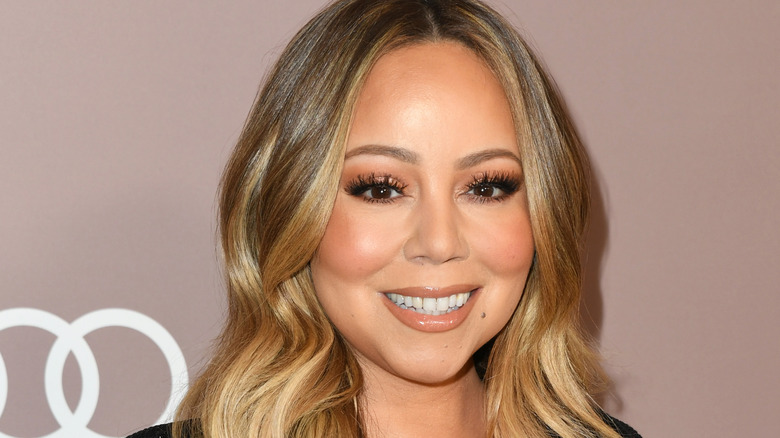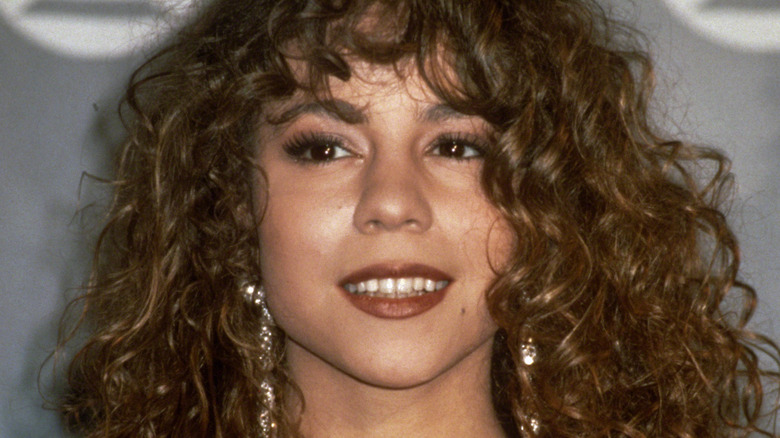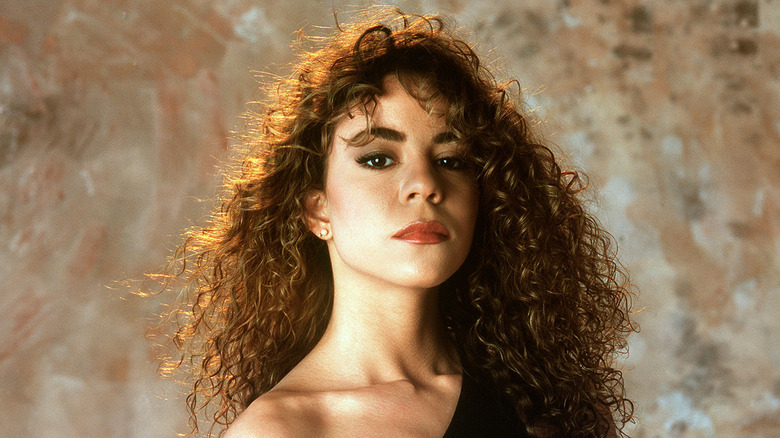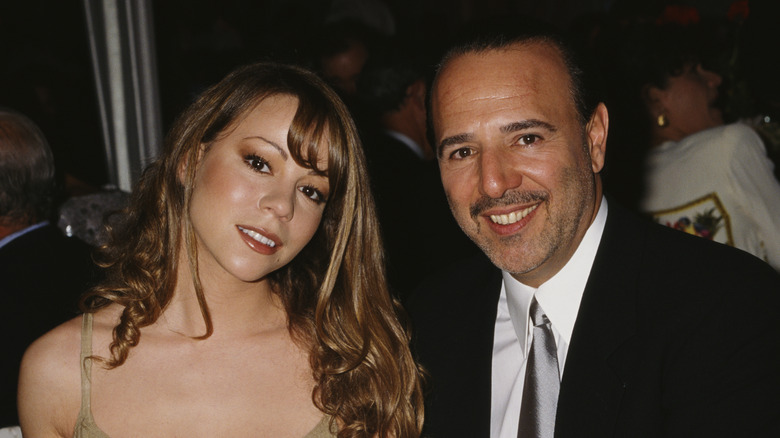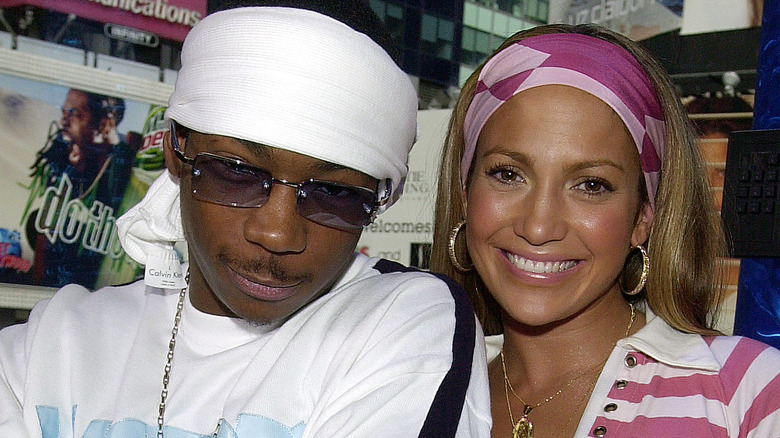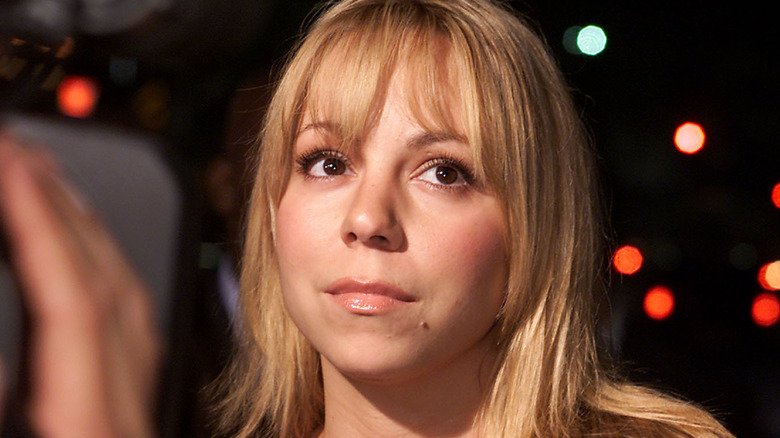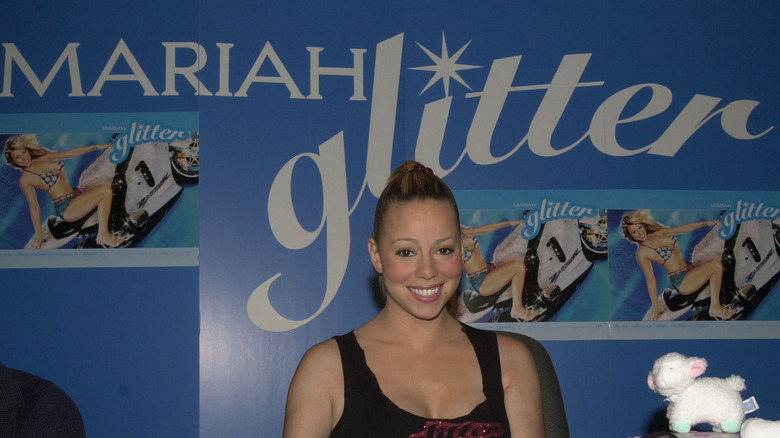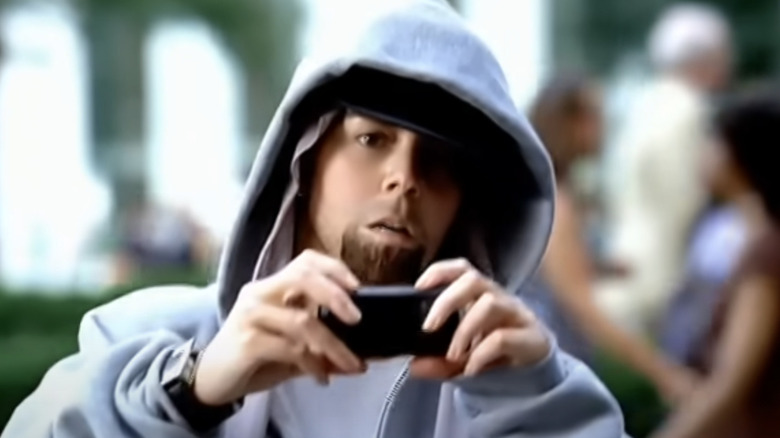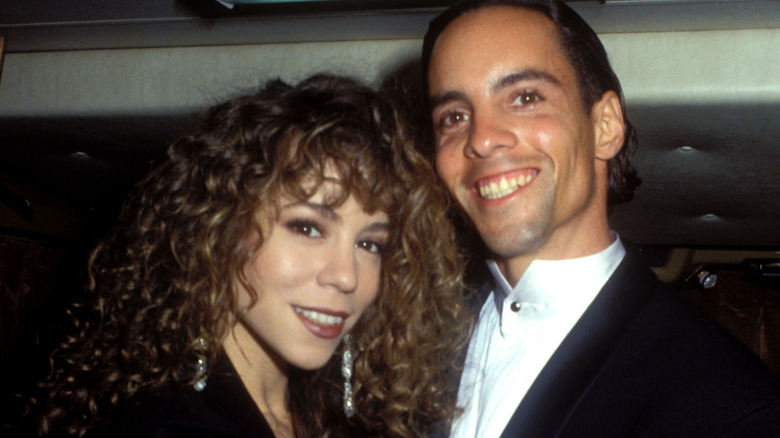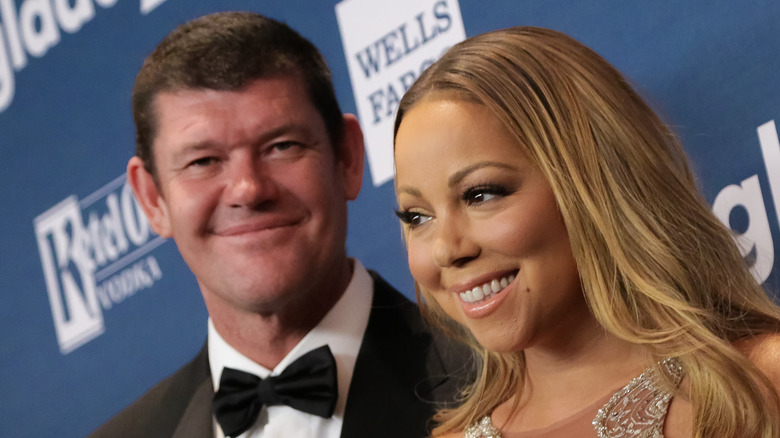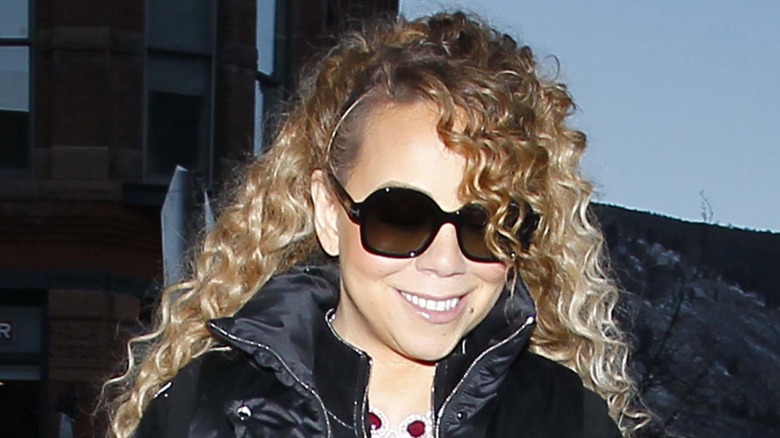The Tragedy Of Mariah Carey Explained
Mariah Carey has made a lot of people happy for a very long time. The self-proclaimed "elusive chanteuse," the erstwhile Mimi, a woman who missed so many classes in high school in pursuit of a singing career that she was nicknamed Mirage (now the name of her entertainment company), Carey is objectively one of the most successful musicians of all time. Singing with an unreal range and blending pop, soul, dance, balladry, and hip-hop, Carey has taken 19 songs to No. 1 on the Billboard Hot 100 since 1990, more than any other solo artist in history. One of those is the perennial, joyful holiday classic "All I Want for Christmas is You." Carey's brand is feeling good. And yet, the road to the top and keeping such a vaunted place in music hasn't been easy.
Not only was being a pop star in the '90s a dark reality, Carey's life has been fraught with pain, struggle, trauma, violence, toxic relationships, self-doubt, illness, and death. Here's a look into the tragic side of the life of Mariah Carey.
The following article includes allegations of child abuse and domestic abuse.
Mariah Carey's childhood was violent and marked with abuse
Domestic violence, from several sources, was a frighteningly normal occurrence during Mariah Carey's childhood in Long Island, New York."By the time I was a toddler, I had developed the instincts to sense when violence was coming," Carey wrote in her memoir "The Meaning of Mariah Carey" (via BBC). "It was not uncommon for holes to be punched in walls or for other objects to go flying," she added, as a result of the arguments between her father and brother. When she was 6, she asked a friend to intervene after her mother was severely beaten. Police came to the home, and Carey remembers one of them saying, "If this kid survives it will be a miracle."
Carey was often a victim of abuse by her sister, Allison, and when she was 12, one incident proved particularly horrific. "My sister drugged me with Valium, offered me a pinky nail full of cocaine, inflicted me with third degree burns and tried to sell me out to a pimp," Carey wrote in her memoir (via Entertainment Tonight), adding that her mother knew about the exchange. "I don't know why my mother let me go with her and this man. Perhaps they both wanted me out of their hair for the evening, but my life was in jeopardy in her hands." As of 2020, Carey hadn't spoken to Allison in 26 years and referred to her as her "ex-sister" (via Vulture).
Mariah Carey was the victim of racism and hate crimes in her youth
Mariah Carey identifies as a mixed-race individual as her father was Black and her mother was white. She's experienced racist treatment from people who resent her Black cultural background or assume that she isn't Black at all. In kindergarten, she drew a picture of her family, and it provoked laughter from her teachers. "They said, 'You're doing that wrong. Why are you making your father the wrong color?'" Carey recalled in a 1999 interview with Oprah Winfrey (via NBC's "Today"). "They made me feel like something was wrong with me."
Carey's parents split up in part because her mother's family cut off contact after she decided to marry a Black man. In "The Meaning of Mariah Carey," the singer discusses a jaunt to a friend's house in the Hamptons, where someone directed the N-word at her. She was also once spat on when she was younger because of her race.
Upon the release of her first album in 1990, some critics assumed Carey was white and focused on that aspect. "Carey is a white singer who has a Black vocal style," wrote Dennis Hunt of the Los Angeles Times. That perception was Sony Music's goal, and Carey said her label took pains to remove any hip-hop motifs in her early recordings. In 1995, when she brought in rapper ODB for a remix of her hit "Fantasy," Sony boss (and Carey's then-husband) Tommy Mottola was incensed.
Her first marriage was a psychological nightmare
One of Sony Music leader Tommy Mottola's primary professional concerns in the early 1990s was marketing the music and brand of label signee Mariah Carey. In 1993, just three years into her storied career, the 23-year-old singer married the 43-year-old Mottola — essentially her boss. Viewing the relationship in part as a means of escape and protection from her troubled biological family, Carey still had major doubts about the marriage on her wedding day. "Many reasonable people questioned why I married Tommy. But none of them questioned the decision more than I did," Carey wrote in "The Meaning of Mariah Carey" (via Us Weekly). "I saw no way out. I didn't know what else to do," she added.
Carey felt trapped in the marriage home, which she nicknamed "Sing Sing" after the famously severe prison. "I couldn't talk to anyone that wasn't under Tommy's control. I couldn't go out or do anything with anybody. I couldn't move freely in my own house," she wrote in her memoir (via The Independent), adding that she always had a suitcase packed in case she ever had to stage a hasty exit.
At a mid-1990s dinner party, Carey met baseball star Derek Jeter, who once held one of the most ridiculous contracts in sports history. They hit it off, and had an affair. It was brief, but it was the impetus Carey said she needed to divorce Mottola — she filed in 1997.
Jennifer Lopez stole music from Mariah Carey
Allegedly, some musicians may have stolen some of their biggest hits, among them Jennifer Lopez. That act of supposed creative theft led to bitter resentment from Mariah Carey. In 2001, Lopez released her album "J.LO," which included the song "I'm Real," and then about a month later, she unveiled the sonically dissimilar "I'm Real (Murder Remix)" featuring Murder Inc. rapper Ja Rule, which hit No. 1 on the Billboard pop chart. Both versions of "I'm Real" made use of recordings that Carey had earmarked for songs on the "Glitter" soundtrack, set for release months after "J.LO." But Lopez appropriated them for herself, rendering the clips immediately unusable for anyone else.
The album version of "I'm Real" used a bit of the disco tune "Firecracker," and the remix was another stab at "If We," a duet Ja Rule recorded with Carey. For "Glitter," Carey had to scrap the original "Firecracker"-based version of "Loverboy." According to Murder Inc. head Irv Gotti, the remix was orchestrated by Sony Music boss — and Carey's ex-husband — Tommy Mottola. Having heard Carey's Ja Rule duet, he asked Gotti to arrange the Lopez duet to undercut his ex-wife's project.
Carey would have her revenge. In the 2000s, the German-language magazine show "Taff" asked Carey's opinion on other pop divas of the era. "Beyoncé is fabulous," said Carey. But Lopez?" Carey shook her head, smiled wryly, and quipped, "I don't know her." That moment of celebrity-on-celebrity burn quickly turned into a meme.
Her mother turned her in to the police
Before it disappeared for various reasons, MTV's "TRL" was an important stop on the publicity tour for musicians and youth-courting celebrities promoting their projects. In July 2001, "Glitter"-era Mariah Carey turned up for an appearance on "TRL" and joined the club of musicians who lost it on live TV.
Surprising host Carson Daly, Carey sauntered onto the "TRL" set with an ice cream cart and dressed in an oversized T-shirt. Then Carey told Daly she had a present for him — at which point she stripped away the shirt, handed it off, and revealed a skimpy outfit underneath. Then for several minutes Carey ran around the stage and rambled about a number of subjects. At one point, she noted, "Every now and then, somebody needs a little therapy, and today is that moment for me."
The event was treated by the media and Carey's handlers as a mental health episode. "She has suffered an emotional and physical breakdown," a spokesperson explained to the Associated Press (via Billboard). "She is under psychiatric care." At the time, reports said that Carey had experienced an "emotional and physical breakdown" as well as "extreme exhaustion." In 2020's "The Meaning of Mariah Carey," the singer clarified that at the time, she'd sought out help and comfort with her family. Her mother responded to Carey's behavior by calling the police, and Carey's brother then placed her in a health recovery center, where the singer was diagnosed with bipolar disorder.
'Glitter' temporarily ruined her career
Mariah Carey's first seven albums sold several million copies apiece, and each generated at least one No. 1 hit. And then came "Glitter," Carey's eponymous movie soundtrack that was meant to launch the singer's film career. Critics hated the '80s music industry period piece, and at the bad-movie-honoring Razzie Awards, Carey won Worst Actress. Audiences stayed away: "Glitter" took in just $5.2 million at the worldwide box office.
Moving a million copies and generating one hit single ("Loverboy"), the "Glitter" album was a bomb for someone with Carey's track record. Making matters worse for Carey, the record was the first released under an $80 million, four-album contract she'd just signed with Virgin Records. Rather than conduct any more business with Carey, Virgin bought out Carey's contract to get rid of her. Professionally humiliating, to be sure, but at least Carey made $49 million from Virgin off of one unpopular LP.
Carey blames movie industry personnel and world events for the double "Glitter" misfire. "I was auditioning for smaller roles and wanting to do more independent things. But everybody was like, 'No, she's too well known. She's going to take us out of the movie,'" Carey told reporters in 2010 (according to Digital Spy). And the "Glitter" soundtrack hit record stores 10 days before the movie was released — on September 11, 2001. "Could there be a worse day for that movie to come out?" Carey darkly suggested.
Mariah Carey's vicious feud with Eminem
Sometimes, musician feuds can get out of hand, like the one publicly waged between Mariah Carey and Eminem. The pair either were or were not a couple in the early 2000s, depending on who's telling the story. In 2001, Carey asked Eminem to contribute to her album "Charmbracelet." Instead, said Eminem, the two became romantically involved for a few months. However, Carey says they were never an item.
Both parties would maintain their version of events in the years to come, and they would snipe at the other in their work and in interviews. Eminem mentioned Carey derisively by name, as well as their supposed relationship, throughout his 2002 album "The Eminem Show," and when asked to comment on that and the singer, he told Rolling Stone (via People), "There's truth to that. But on the whole personal level, I'm not really feeling it. I just don't like her as a person."
A response of sorts, the video for Carey's 2009 single "Obsessed" revolves around a stalker character who closely resembles Eminem (and played by Carey herself, pictured above). Ten years later, the rapper kept the feud going in an appearance on the 2019 Fat Joe song "Lord Above." Eminem claims that "he tried to tell Nick" — as in Carey's by then ex-husband Nick Cannon — that Carey was "a nut job."
Mariah Carey's siblings sued her
Mariah Carey published her memoir, "The Meaning of Mariah Carey" in 2020. The book describes in excruciating, horrific detail the abuse Carey remembers suffering at the hands of her siblings, and it recounts some of the ugliest, most violent moments in her family's personal history. One such instance was a fight between the singer's father, Alfred Carey, and her brother, Morgan Carey. Labeling her sibling as "equally violent as their father" (via People), Carey reported that it took 12 police officers to end the fight. That passage directly led to Morgan Carey filing a defamation lawsuit against his sister in March 2021.
The pop star defended herself in a legal filing, claiming that defamation was not her intention, but rather to build up readers who had experienced the same kind of domestic violence situation. In more paperwork, Morgan Carey took umbrage with the book's failure to mention his severe childhood medical issues: "Cerebral Palsy, Grand Mal Epilepsy, and a two-inch leg disparity," he wrote (via People).
Also filing suit in 2021 for the contents of "The Meaning of Mariah Carey" was the author's sister, Alison Carey. Because Carey wrote about how her sister allegedly attempted to sell her into sex work when she was a minor, and how a cup of hot tea thrown at her by Alison led to severe burns, the lawsuit claimed that it constituted intentional emotional distress. Alison Carey demanded payment of $1.25 million.
Her later relationships ended badly
Mariah Carey met Nick Cannon at the 2005 Teen Choice Awards and they married in 2008, about six weeks after they started a relationship. The couple's twins were born in 2011, and the marriage ended in 2014. It took two years for the divorce to finalize, which in retrospect, seemed unnecessarily painful to Carey. "I think Nick and I could have worked it out between the two of us, but egos and emotions got inflamed," Carey wrote in "The Meaning of Mariah Carey" (via People). "It was tough. We both wanted to make sure everything was cool for our family."
While the divorced parents have kept things civil, the split between Carey and her next partner — and at one point fiancé — businessman James Packer, was rough on the singer. Around the same time that her divorce was legally completed in 2016, Carey and Packer were breaking up. Amidst rumors of infidelity and money problems, a person with knowledge of the situation told People, "James has not been in a mentally healthy place and has not been present for Mariah or her family," and "His behavior was not a desirable situation for Mariah so she unfortunately had to leave him."
A representative for Packer responded to the news, asserting that mental health wasn't a factor, adding that it was "typical Mariah to just twist things that don't sound good to her. They split because she has issues."
Mariah Carey's mother and sister died on the same day
Mariah Carey's parents divorced in 1973, when she was 3, and she only saw her father, Alfred Roy Carey, once a week or so, and far less after she became an adult. Daughter and father made amends before the latter died in 2002 at the age of 72 from bile duct cancer. In 2003, she wrote and recorded the song "Sunflowers for Alfred Roy," a tribute to her deceased father.
Carey's other parent, opera singer Patricia Carey, died in late August 2024. "My heart is broken that I've lost my mother," Carey said in a statement (via the Associated Press). "I feel blessed that I was able to spend the last week with my mom before she passed." In a particularly tragic coda to the death of her mother, Mariah Carey's sister died on the same day. Alison Carey, enrolled in hospice treatment after organ failure and unable to obtain an increase in Social Security benefits to help pay for her care, was 63 years old. While Carey was effectively estranged from her immediate family, the deaths of her close relatives still had a profoundly sorrowful effect on the singer.
If you or anyone you know may be the victim of child abuse, is dealing with domestic abuse, or needs help with mental health, contact the relevant resources below:
-
The Childhelp National Child Abuse Hotline at 1-800-4-A-Child (1-800-422-4453) or contact their live chat services.
-
The National Domestic Violence Hotline at 1−800−799−7233. You can also find more information, resources, and support at their website.
-
The Crisis Text Line by texting HOME to 741741, call the National Alliance on Mental Illness helpline at 1-800-950-NAMI (6264), or visit the National Institute of Mental Health website.
